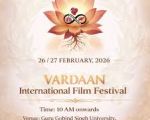Bengaluru – The Bengaluru International Film Festival (BIFFES 2025), in collaboration with the Polish Institute, recently presented a retrospective on the legendary Polish filmmaker Krzysztof Kieslowski. This special segment at the festival featured seven of Kieslowski’s greatest cinematic masterpieces, including the acclaimed Three Colors trilogy (Blue, White, Red), Camera Buff (Amator), The Double Life of Veronique, and two parts of Dekalog.
The retrospective opened with the screening of Three Colors: Blue to a packed theatre, receiving an overwhelming response from cinephiles. On the occasion, N Vidyashankar, Artistic Director of the Bengaluru International Film Festival, highlighted the significance of retrospectives in celebrating cinematic legacies and deepening audiences’ understanding of film history.
Polish cinema benefits from the invaluable contributions of legendary directors such as Andrzej Wajda, Krzysztof Zanussi, and Krzysztof Kieslowski. Kieslowski’s work as visual poetry, emphasizing the director’s unique ability to weave humanistic and philosophical themes into compelling narratives. The retrospective offers Indian cinephiles a rare opportunity to experience the brilliance of Kieslowski’s filmography on the big screen.
Director of the Polish Institute, Malgorzata Wejsis-Gołębiak, expressed her enthusiasm for bringing Kieslowski’s works to Bengaluru, stating:”We are honored to bring a full-fledged retrospective of Krzysztof Kieslowski to the Bengaluru International Film Festival 2025, celebrating one of Poland’s most visionary filmmakers. Kieslowski’s cinema transcends borders, weaving profound philosophical and humanistic themes into deeply personal narratives. Showcasing his masterpieces, including the ‘Three Colors’ trilogy, ‘Camera Buff,’ ‘The Double Life of Veronique,’ as well as two parts of ‘Dekalog’ at BIFFES, is a tribute to his enduring influence on world cinema and a testament to the cultural bridge between Poland and India.”
The Kieslowski Retrospective at BIFFES 2025 stood as a testament to the festival’s commitment to bringing global cinema to Indian audiences and fostering international cultural exchange. The retrospective drew film enthusiasts, students, and scholars eager to explore the masterful storytelling and profound themes that define Kieslowski’s work.





